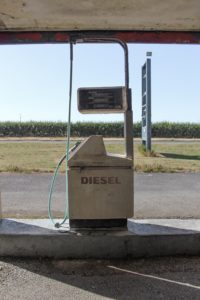Is bigger better when looking at trucks?
Considering buying a diesel truck? Powerstroke, Cummins, and Duramax diesel-powered trucks are bigger and  stronger and can haul heavy loads or tow heavy trailers (over 10,000 pounds and more). But is bigger always better? Before you sink your money into a hefty diesel, there are some things you need to know and considerations to take into account.
stronger and can haul heavy loads or tow heavy trailers (over 10,000 pounds and more). But is bigger always better? Before you sink your money into a hefty diesel, there are some things you need to know and considerations to take into account.
First, consider what you are going to use that big truck for and whether your needs really justify the increased purchase price (close to $10,000 more than a gas-powered truck). Although diesel trucks generally hold their value better and last longer than gas trucks, they should only be purchased if you have the need to tow or haul heavy duty loads. Take into account that gas engines can have more horsepower than diesels, but diesel trucks have more torque (horsepower equals torque multiplied by RPM). Therefore, diesel trucks are especially good for hauling frequent, heavy duty loads. If you only require that kind of duty occasionally, your diesel truck may not perform well over the long term.
The downside of buying that big diesel truck and NOT using it for frequent, heavy towing is that deposit build-ups will build up in the engine if you drive it like a grandma! For example, if you are buying a diesel truck to tow a 2000-pound travel trailer occasionally, the DPF (diesel particulate) filters and EGR (Exhaust Gas Recirculation) valves will accumulate contaminates and moisture more quickly. These engines and their components are designed to work hard and do not do well under light duty useage.
If you have a diesel truck and are noticing loss of power, rough idle, poor fuel economy or your Check Engine Light is on, you may have clogged EGR valves. Loss of power or excessive smoke may indicate a blocked DPF, which can occur if the vehicle hasn’t been driven for a long time or it has not gotten hot enough to burn the built-up soot. These are only two of the possible problems that can occur in a diesel truck related to not using your truck the way it was intended.
Be aware that consequences of not maintaining your diesel truck can have very expensive consequences! Maintenance costs are good insurance against higher cost repairs and replacements.
Our diesel technicians point out that all maintenance costs on a diesel truck are significantly higher than on other vehicles. Take into account that all of the fluids require larger quantities. For example, diesel trucks can hold 6-8 gallons of coolant, whereas a gas truck only holds about 2-3 gallons. Passenger vehicles generally require 4-6 quarts of engine oil, gas trucks hold 6-7 quarts, but a diesel truck requires 12-15 quarts (or more!). If the oil is allowed to go too low, the result could be damage to the engine and the only fix is engine replacement (minimum $13,000).
Fuel filters require periodic replacement, about every 15,000 miles. And some diesel trucks have 2 filters. If the fuel filters are not replaced as recommended, water and contaminants can get into the fuel, which can cause injector damage. Changing the fuel filters will run a little over $200 (for two). However, the cost of not replacing them routinely may lead to having to replace the injectors, which can run $2-5,000! Be proactive by taking care of maintenance tasks prior to having problems!
Complex systems in diesel trucks are dependent upon one another. If one system has a problem, it can affect the working of another system that may appear totally unrelated. Experienced diesel technicians are crucial for figuring out problems like these that are not readily clear.
Also, replacement parts (starters, alternators, water pumps, batteries) and wear items (like brakes, tires and belts) on a diesel truck will be bigger and more expensive. Other systems in diesel engines that are not present in gas engines, such as turbochargers that require maintenance, selective catalytic reduction and emission systems all add up to increased costs when requiring repairs or replacement.
If, after taking in these considerations, you still think that a diesel truck will meets your driving and hauling requirements, by all means go for it! Just going in with your eyes open and being realistic regarding the costs of diesel truck ownership will allow you to enjoy owning and driving that big, beautiful truck. Our experienced, skilled diesel technicians at Honest Accurate Auto Service welcome any questions.




